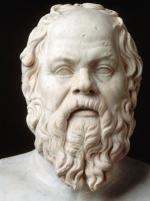|
This section contains 4,690 words (approx. 16 pages at 300 words per page) |

|
SOURCE: "Socrates's Charitable Treatment of Poetry," in Philosophy and Literature, Vol. 13, No. 2, October, 1989, pp. 248-61.
In the following essay, Pappas examines Socrates's interpretation of poetry and its relation to his philosophical positions.
Of course this title seems wrong. If anything is certain about Socrates' treatment of poetry in Plato's dialogues, it is that he never gives a poem a chance to explain itself. He dismisses poems altogether on the basis of their suspect moral content (Republic II and III), or their representational form (Republic X), or their dramatic structure (Laws 719); he calls poets ignorant (Apology, Ion) and—not obviously as a compliment—mad (Ion, Phaedrus); and when he wants to use a poem to support his own position, he unhesitatingly distorts its apparent meaning (Protagoras, Lysis).
I will not argue that, in spite of this behavior, Socrates occasionally gives poetry its due, nor that even as he dismisses...
|
This section contains 4,690 words (approx. 16 pages at 300 words per page) |

|


